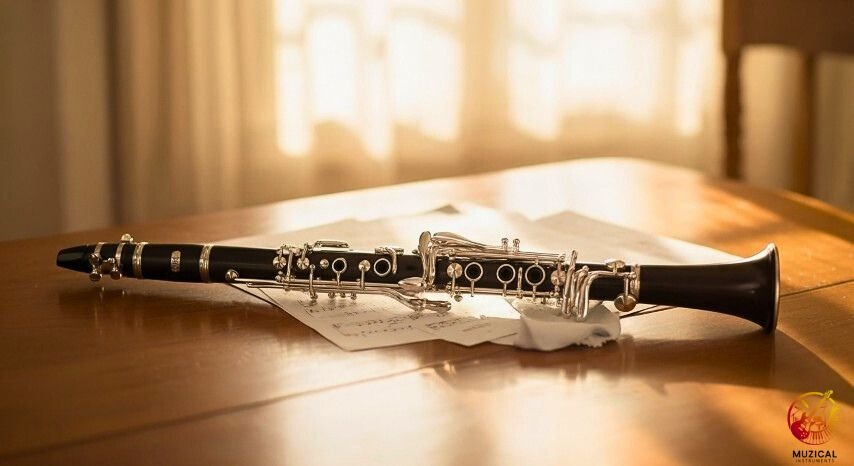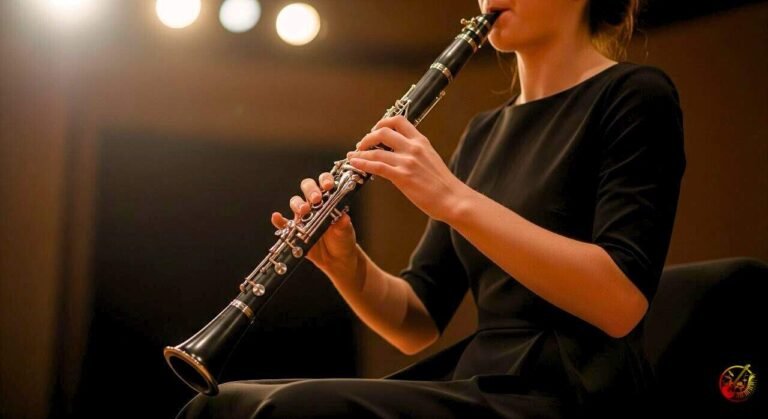Why Do Clarinets Squeak So Much? Common Reasons Explained
The clarinet squeaking problem is the first, and loudest, hurdle for almost every new player. That sudden, high pitched shriek can be frustrating, but it’s rarely a mystery. It’s a signal that something in your setup, your reed, your mouth, or your instrument needs a small adjustment.
This guide will show you exactly why do clarinets squeak? You’ll learn the most common causes and, more importantly, the simple fixes for each one. We’ll cover everything from the reed you use to the way you hold the instrument.
Why Do Clarinets Squeak?
Before we dive into the fixes, let’s understand what a squeak is. A clarinet produces sound when air makes the reed vibrate. This creates a fundamental tone, which is the note you want to hear.
A squeak is just an unwanted overtone or harmonic. It happens when the reed vibrates in a chaotic or uncontrolled way, producing a much higher frequency than intended. Think of it like a guitar string vibrating in weird sections instead of as one whole length.
Every clarinetist, from a first year student in a school band to a professional in the New York Philharmonic, squeaks occasionally. The difference is that experienced players instantly know why it happened and how to prevent the next one.
Reason 1: Your Reed is 90% of the Problem

If your clarinet squeaks, check the reed first. This small piece of cane is the engine of your sound, and if it’s not perfect, nothing else matters. The most common clarinet squeak causes are related to this tiny piece of wood.
Reed Position and Ligature
Proper placement is crucial. A small mistake here will cause squeaks.
- Tip Alignment: Line up the reed tip with the mouthpiece tip, leaving a hairline of black visible.
- Centering: Center the reed perfectly on the mouthpiece table for an even vibration.
- Ligature Placement: Place the ligature over the flat stock of the reed. Don’t overtighten, as this chokes the sound.
The Condition of the Reed
Reeds are delicate and wear out. Always check their condition.
- Chips and Cracks: Even a tiny chip or crack will cause squeaks. Inspect reeds closely and discard any damaged ones.
- Warping: A warped reed won’t seal against the mouthpiece. If it doesn’t lie flat, it’s often unusable.
- Old and Worn Out: Old reeds become flimsy and prone to squeaking. Replace them after 10-20 hours of play.
Reed Strength: The Beginner’s Trap
Beginners often use reeds that are too hard. Reed strength is numbered (1.5, 2, 2.5), and higher numbers require a stronger mouth muscle (embouchure).
Using a reed that’s too strong forces you to bite, which chokes the sound and causes squeaks. Start with a softer strength (1.5 or 2) from brands like Vandoren and increase it only as your embouchure strengthens.
| Player Level | Common Reed Strength (Vandoren) | What it Feels Like | Common Problems if Too Hard |
|---|---|---|---|
| Absolute Beginner | 1.5 – 2 | Very easy to produce a sound. Requires little air pressure. | Squeaking, stuffy sound, feeling like you’re blowing against a wall. |
| 3–6 Months | 2 – 2.5 | Offers a bit more resistance. The sound is fuller and less buzzy. | Lip fatigue, biting to force a note out, uncontrolled squeaks. |
| 1+ Year | 2.5 – 3+ | Requires strong, steady air support. Produces a rich, dark tone. | Only advanced players should use harder reeds; not a beginner issue. |
Reason 2: Your Embouchure
If you’re certain your reed is good, the next place to look is in the mirror. Your embouchure, the way you shape your mouth is the other half of the sound equation.
The “Don’t Bite” Rule
This is the most important of all beginner clarinet tips. Many players, when they squeak, instinctively bite down harder with their lower jaw. This is the exact opposite of what you should do.
Biting puts immense pressure on the reed, stopping it from vibrating properly. This is a primary cause of squeaks, especially when changing notes.
A good clarinet embouchure looks like this:
- Start by saying the word “we.” Your lips should be in a firm, flat line.
- Roll your bottom lip slightly over your bottom teeth. This creates a cushion for the reed.
- Keep your chin flat and pointed down (think of saying “ooo”).
- Rest your top teeth gently on the top of the mouthpiece about a half-inch from the tip.
- Close your lips around the mouthpiece as if you were tightening a drawstring bag, creating a firm seal. The pressure should come from the corners of your mouth, not from your jaw biting up.
Reason 3: Air Support and Breath Control

You need consistent air pressure to play clarinet.
Inconsistent airflow creates unstable vibrations. Unstable vibrations create squeaks.
Weak Air Support
- Blowing too gently or without proper support causes the reed to vibrate inconsistently, leading to squeaks.
- Use steady, supported air from your diaphragm. Your belly should expand when you breathe in and feel engaged as you blow out.
- Think of the constant pressure needed to blow up a balloon, not short, weak puffs of air.
Too Much Air
- Forcing too much air through the instrument can overblow the reed.
- This causes the reed to vibrate too fast, jumping to a higher harmonic, which you hear as a squeak.
- Your airflow needs to match the reed’s strength; a harder reed can handle more air pressure than a softer one.
Inconsistent Air Stream
- An unsteady or fluctuating airstream will make the reed’s vibration unstable.
- Your air should flow continuously like water from a faucet, not in bursts like a squirt gun.
- Practice long tones, holding a single note with a perfectly even sound to build steady breath control.
Reason 4: The Clarinet Itself

Sometimes, the squeaking isn’t your fault at all. The instrument itself can have mechanical problems, especially if it’s a school rental or an older horn.
Leaky Pads
Your clarinet has pads that cover the tone holes to create an airtight seal. If even one pad is torn, worn out, or not sealing properly, air will leak.
An air leak makes the clarinet much harder to play. To compensate, you’ll blow harder and bite down, which, as we’ve learned, leads to squeaks. A common sign of a leak is when one specific note is always stuffy, hard to play, or squeaks consistently. A repair technician can use a leak light to find and fix these issues quickly.
Key Regulation and Bent Keys
The keywork on a clarinet is complex. Many keys are designed to move together. If one key gets slightly bent (from being dropped or assembled incorrectly), it can throw off the “regulation,” meaning other keys won’t close properly.
This is not something you should try to fix yourself. Bending keys can cause more damage. If you suspect a mechanical issue, take it to a professional for servicing. A standard annual service is a good idea for any clarinetist.
Common Instrument Problems That Cause Squeaks
- Sticky Pads: A pad (especially the G# key) can get sticky and open slowly, causing a squeak as you change notes.
- Worn Tenon Corks: The corks that connect the upper joint, lower joint, and barrel can wear down, causing leaks.
- Incorrect Assembly: Jamming the joints together can bend the bridge key, creating a leak and causing squeaks when playing notes like B and C.
How to Stop Clarinet Squeaking: A Troubleshooting Guide
So, you squeaked. What do you do right now? Here’s a checklist to run through.
| When Does it Squeak? | Check This First (The Reed) | Then Check This (Yourself) | Finally, Check This (The Horn) |
|---|---|---|---|
| On every single note | Is your reed chipped? Is it centered and aligned properly on the mouthpiece? Try a different reed. | Are you biting? Relax your jaw. Is your embouchure firm at the corners? Take a deeper, faster breath. | A major leak is possible. A key might be stuck open. This likely requires a trip to the repair shop. |
| Only when crossing the “break” (A to B) | Is your reed too soft? The “break” requires more resistance, and a soft reed can collapse. | You’re likely not using enough air support. Blow faster, colder air as you press the register key. Avoid “bumping” the note with your tongue. | A leaky register key pad or poorly adjusted keys in the upper joint could be the culprit. |
| Only on high notes (Clarion Register) | Your reed may be too soft or worn out. High notes need a strong, stable reed. | High notes require the fastest air. Focus your airstream. Also, check that you aren’t taking too much mouthpiece into your mouth. | Small leaks that don’t affect low notes can cause squeaks in the upper register. |
| On one specific note every time | This is rarely a reed issue unless it’s a very specific frequency problem. | Check your hand position. Are you fully covering the tone holes? An incompletely covered hole is a leak. | This is the classic sign of a leaky pad or poor key regulation corresponding to that specific note. |
Tips & Best Practices for Reducing Squeaks Long Term
- Rotate multiple reeds rather than using just one.
- Warm up before tackling high or fast parts.
- Do embouchure & long-tone stability exercises daily.
- Always check your instrument (pads, key alignment) every few months.
- Record, analyze, and self-correct awareness helps.
- Work with a teacher or technician. They see things you might miss.
Final Thoughts
So, why do clarinets squeak so much? The answer usually lies in one of four areas: a bad or poorly positioned reed, an undeveloped embouchure, weak air support, or a mechanical leak in the instrument. For beginners, the culprit is almost always the reed or the embouchure.
The squeak isn’t a sign of failure; it’s a request for an adjustment. By methodically checking your reed, focusing on your fundamentals, and ensuring your instrument is in good working order, you can turn those frustrating shrieks into a beautiful, clear tone.
Be patient, be methodical, and remember to blame the reed first!
FAQ: Why Do Clarinets Squeak So Much?
1. Is it normal for a beginner clarinet to squeak?
Yes, it’s completely normal! Every single clarinet player squeaks when they are learning. It’s a sign that you are figuring out the right balance between your air, your mouth, and the reed. Don’t get discouraged; it happens to everyone.
2. How can I stop my clarinet from squeaking right now?
The fastest way to fix a squeak is to check your reed. Is it chipped? Is it perfectly centered on the mouthpiece? Next, relax your jaw, don’t bite down! Take a deep breath and blow a steady, cool stream of air. One of these quick checks usually solves the problem.
3. Can a bad reed cause my clarinet to squeak?
Absolutely. In fact, a bad reed is the most common reason for a clarinet squeaking problem. If the reed is chipped, cracked, warped, or just old, it cannot vibrate properly. This almost always leads to squeaks. When in doubt, try a new reed.
4. Why does my clarinet squeak only on certain notes?
This usually points to a leak. First, check that your fingers are completely covering the holes for that note. Even a tiny gap will cause a squeak. If your fingers are fine, the instrument might have a leaky pad, which means a repair technician needs to take a look.
5. Why do I squeak more when I play high notes?
High notes require a faster and more focused stream of air. If your air support is weak or unsteady, the reed won’t vibrate correctly, and you’ll get a squeak. It can also mean your reed is too soft or old and can’t handle the pressure needed for the upper register.
6. What does “crossing the break” mean, and why does it squeak?
“Crossing the break” is when you move from a lower note (like A) to a higher one (like B) by pressing the register key. This is a common trouble spot. Squeaks happen here because you need to increase your air speed at the exact moment you switch notes. If your air slows down, you’ll squeak.
7. How do I know if my mouth shape is causing squeaks?
Your mouth shape, or embouchure, is very important. If you bite down hard with your jaw, you will choke the reed and cause it to squeak. The pressure should come from the corners of your mouth, like you’re tightening a drawstring. Keep your chin flat and pointed down.




